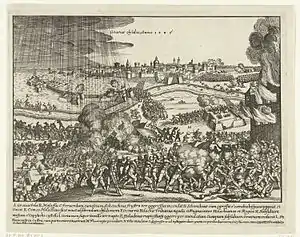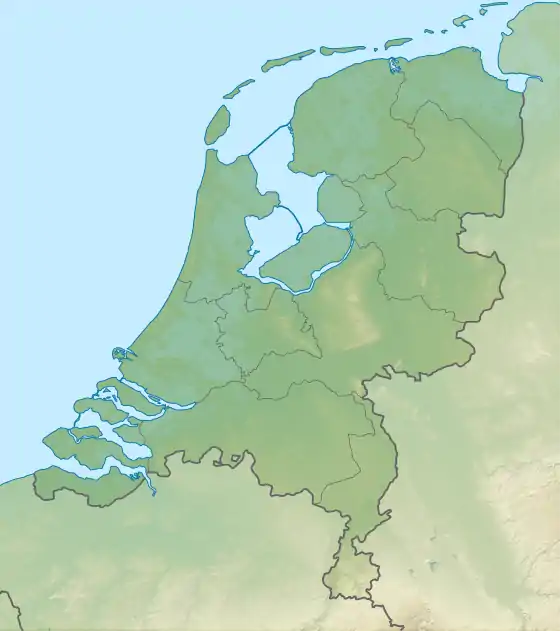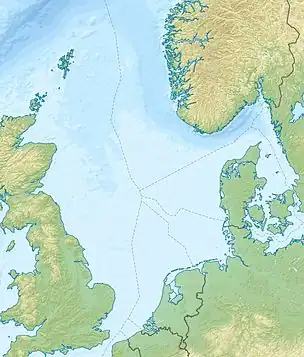Siege of Grave (1586)
The siege of Grave, also known as the capture of Grave of 1586, took place from mid-February to 7 June 1586 at Grave, Duchy of Brabant, Low Countries (present-day the Netherlands), between the Spanish army led by Governor-General Don Alexander Farnese, Prince of Parma, and the Dutch-States and English forces under Baron Peter van Hemart, Governor of Grave, during the Eighty Years' War and the Anglo-Spanish War (1585–1604).[1][2]
| Siege of Grave (1586) | |||||||
|---|---|---|---|---|---|---|---|
| Part of the Eighty Years' War and the Anglo-Spanish War (1585–1604) | |||||||
 The Siege of Grave in 1586 by Don Alejandro Farnesio – engraving by Michelangelo Cerquozzi | |||||||
| |||||||
| Belligerents | |||||||
|
|
| ||||||
| Commanders and leaders | |||||||
|
|
| ||||||
 Location within Netherlands  Siege of Grave (1586) (North Sea) | |||||||
Events
In February of 1586, the Count Peter Ernst of Mansfeld, by order of Alexander Farnese, laid siege to the town of Grave.[3][4] After three monthsh, and faced with the failure of the English and Dutch forces to relieve the city, Grave surrendered to the Spaniards on 7 June.[1][2] The capture of the strategically important town of Grave by Parma, and the impotence of the English commander Sir Robert Dudley, Earl of Leicester, to relieve the town, in a time where England had raised hopes to the Dutch rebels thanks to the Treaty of Nonsuch, was a complete military and political success for the Spanish authorities, and a severe blow for the Protestant cause, provoking the start of the disagreements of the States-General of the Netherlands with the Earl of Leicester.[1][2][5]
A few days later, the Spanish army, commanded by the Prince of Parma, laid siege to Venlo, garrisoned and supported by Dutch and English troops led by Maarten Schenck and Sir Roger Williams.[6] On 28 June 1586 the garrison was forced to capitulate to the Spaniards.[6][7]
See also
Notes
- Graham Darby p.190
- Giménez Martín p.189
- Giménez Martín p.188
- Martín p. 189
- J.D. Tracy. The Founding of the Dutch Republic (2008)
- John Lothrop Motley. History of the United Netherlands: from the death of William the Silent to the Synod of Dort. p.326
- Hume & Lingard p.52
References
- Darby, Graham. The Origins and Development of the Dutch Revolt (Routledge, 2001) ISBN 0-203-42397-6
- Black, Jeremy. European Warfare 1494-1660. Routledge Publishing 2002. ISBN 978-0-415-27531-6
- Motley, John Lothrop. History of the United Netherlands: from the death of William the Silent to the Synod of Dort. Rotterdam 1872.
- Marek y Villarino de Brugge, André (2020e). Alessandro Farnese: Prince of Parma: Governor-General of the Netherlands (1545-1592): v. V. Los Angeles: MJV Enterprises, ltd., inc. ISBN 979-8689560397.
- Giménez Martín, Juan. Tercios de Flandes. Ediciones Falcata Ibérica. First edition 1999, Madrid. ISBN 84-930446-0-1 (in Spanish)
- David Hume & John Lingard. The History of England: From the Invasion of Julius Caesar to the Revolution in 1688. Vol II. Philadelphia 1859.
- Tracy, J.D. (2008). The Founding of the Dutch Republic: War, Finance, and Politics in Holland 1572–1588. Oxford University Press. ISBN 978-0-19-920911-8
External links
- Tercios de Flandes by Juan Giménez Martín (in Spanish)